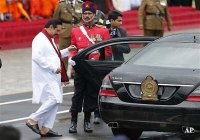Former President Mahinda Rajapaksa stated that the government's first duty is to stand by its war heroes.
Releasing a statement today, Rajapaksa said that the government has agreed to participation of foreign judges and other experts in the judicial mechanism proposed. The government also attempts to whitewash its mistakes by claiming that it was able to win concessions such as the GSP+, he argued.
Meanwhile, Rajapaksa added that he was being blamed for worsening the situation when he was in power and rejected the government's allegations.
The full text of the statement:
Though the passage of the US sponsored resolution against Sri Lanka in the UNHRC without a vote last Thursday is being hailed as a diplomatic victory for Sri Lanka, I am unable to share that view.
Operative paragraph 6 of the resolution affirms the importance of the participation of foreign judges, prosecutors, lawyers and investigators in the Sri Lankan judicial mechanism to be set up to investigate alleged human rights abuses during the war. Operative paragraph 8 encourages the Sri Lankan government to remove individuals in the armed forces suspected of human rights violations through an administrative vetting process even if there is insufficient evidence to charge them in a court of law. Operative paragraph 4 welcomes the government’s willingness to allow the various judicial and other mechanisms it intends to establish to deal with the past, to obtain financial assistance from overseas, which means that these supposedly Sri Lankan mechanisms will be paid for and maintained by foreign powers.
Those are just a few of the objectionable operative paragraphs in that resolution. After its passage, the Prime Minister said that Sri Lanka has now been ‘taken off the agenda in the UNHRC’. Posters of the UPFA have appeared on the streets hailing the government for delivering the country from the ‘imperialist death trap’ in Geneva. Such statements sit oddly beside the operative paragraphs of the resolution mentioned above. The mismatch between the provisions of the resolution that was passed and the government’s present mixed signals and rhetoric may be due to a belated realisation that nothing has been gained by Sri Lanka joining the USA as a co-sponsor of this resolution except to commit the government to a course of action which runs contrary to the interests of this country and is therefore politically unfeasible.
I acknowledge that there are times when foreign powers try to foist their way of thinking upon other nations and the country at the receiving end has to find ways of dealing with the situation. The first duty of the Sri Lankan government is to see to it that the interests of our war heroes are looked after. Operative paragraphs 6 & 8 of the resolution run directly contrary to that sacred duty. I regret to note that there is an attempt to whitewash the unfavourable resolution in Geneva by claiming that this was the best that could be achieved and that things could have been far worse with the near certainty of economic sanctions if my government had been still in power. The withdrawal of the GSP+ trade concession in 2010 and the ban on Sri Lankan fish imports to the EU in January 2015 were mentioned as the forerunners of the sanctions that were to be imposed on Sri Lanka.
The public should be made aware that the ban on fish imports to the EU this year was due to issues relating to ‘illegal, unreported and unregulated’ fishing in the Indian Ocean in contravention of the rules of the Indian Ocean Tuna Commission and had nothing at all to do with politics or human rights. As for GSP+, this is a special trade concession of doubtful utility which gives the EU a political handle over the recipient country. In 2010 when GSP+ came up for its quinquennial review and this was being used to impose the EU’s will on Sri Lanka, my government made a conscious decision not to reapply for GSP+. Even after this trade concession was withdrawn, my government ensured that apparel exports to the EU kept growing at more than 6% a year. It should be noted that no major exporting country in Asia has applied for GSP+ due to the political strings attached to it.
It was also said that I had antagonised the Western nations by being photographed with my arm around Muammar Gaddafi of Libya. It is actually Gaddafi who has his arm on my shoulder in that much publicised photograph. In the last months of the war in 2009 when Sri Lanka was fast losing foreign reserves due to the severe global economic recession that year and the IMF under pressure from the Western nations was delaying the standby facility that we were entitled to, Muammar Gaddafi agreed to lend 500 million USD to Sri Lanka in response to a single phone call from me. If not for that pledge, the economy would have collapsed before the war could be won.
It was also said that when foreign dignitaries came to Sri Lanka to persuade us to stop the war, I had deliberately insulted them by taking them to Embilipitiya and giving them manioc to eat, and that that resentment was motivating the Western countries to pass resolutions against us. I have no recollection what was on the menu when the British and French foreign ministers met me in the final days of the war demanding that I halt hostilities. But it is certainly true that I refused point blank to halt the war. It is because I did not buckle under foreign pressure that this country is free of terrorism today. Governments are elected by the people of Sri Lanka to do what is best for the country and not to agree to everything said by foreign powers. That applies to the resolution that has just been passed in Geneva as well.
Mahinda Rajapaksa (MP)
Former President of Sri Lanka











